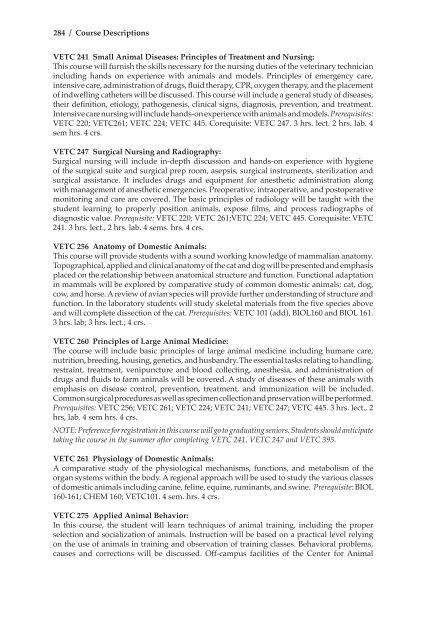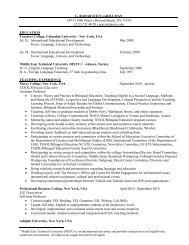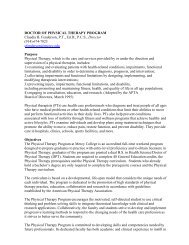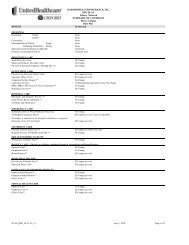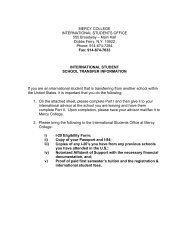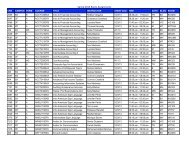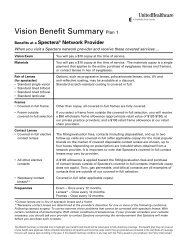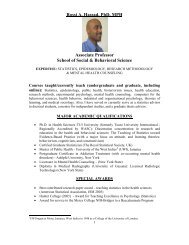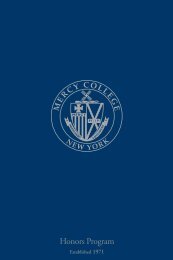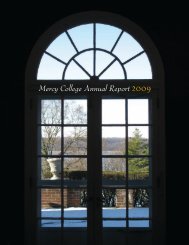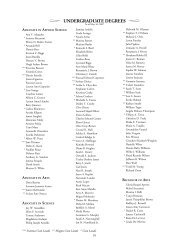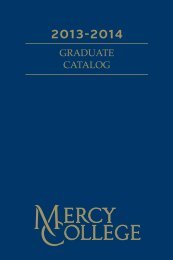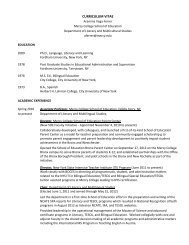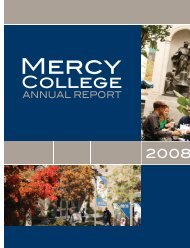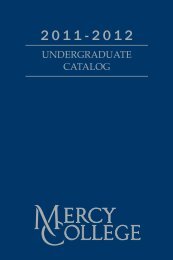UNDERGRADUATE CATALOG - Mercy College
UNDERGRADUATE CATALOG - Mercy College
UNDERGRADUATE CATALOG - Mercy College
You also want an ePaper? Increase the reach of your titles
YUMPU automatically turns print PDFs into web optimized ePapers that Google loves.
284 / Course Descriptions<br />
VETC 241 Small Animal Diseases: Principles of Treatment and Nursing:<br />
This course will furnish the skills necessary for the nursing duties of the veterinary technician<br />
including hands on experience with animals and models. Principles of emergency care,<br />
intensive care, administration of drugs, fluid therapy, CPR, oxygen therapy, and the placement<br />
of indwelling catheters will be discussed. This course will include a general study of diseases,<br />
their definition, etiology, pathogenesis, clinical signs, diagnosis, prevention, and treatment.<br />
Intensive care nursing will include hands-on experience with animals and models. Prerequisites:<br />
VETC 220; VETC261; VETC 224; VETC 445. Corequisite: VETC 247. 3 hrs. lect. 2 hrs. lab. 4<br />
sem hrs. 4 crs.<br />
VETC 247 Surgical Nursing and Radiography:<br />
Surgical nursing will include in-depth discussion and hands-on experience with hygiene<br />
of the surgical suite and surgical prep room, asepsis, surgical instruments, sterilization and<br />
surgical assistance. It includes drugs and equipment for anesthetic administration along<br />
with management of anesthetic emergencies. Preoperative, intraoperative, and postoperative<br />
monitoring and care are covered. The basic principles of radiology will be taught with the<br />
student learning to properly position animals, expose films, and process radiographs of<br />
diagnostic value. Prerequisite: VETC 220; VETC 261;VETC 224; VETC 445. Corequisite: VETC<br />
241. 3 hrs. lect., 2 hrs. lab. 4 sems. hrs. 4 crs.<br />
VETC 256 Anatomy of Domestic Animals:<br />
This course will provide students with a sound working knowledge of mammalian anatomy.<br />
Topographical, applied and clinical anatomy of the cat and dog will be presented and emphasis<br />
placed on the relationship between anatomical structure and function. Functional adaptation<br />
in mammals will be explored by comparative study of common domestic animals: cat, dog,<br />
cow, and horse. A review of avian species will provide further understanding of structure and<br />
function. In the laboratory students will study skeletal materials from the five species above<br />
and will complete dissection of the cat. Prerequisites: VETC 101 (add), BIOL160 and BIOL 161.<br />
3 hrs. lab; 3 hrs. lect.; 4 crs.<br />
VETC 260 Principles of Large Animal Medicine:<br />
The course will include basic principles of large animal medicine including humane care,<br />
nutrition, breeding, housing, genetics, and husbandry. The essential tasks relating to handling,<br />
restraint, treatment, venipuncture and blood collecting, anesthesia, and administration of<br />
drugs and fluids to farm animals will be covered. A study of diseases of these animals with<br />
emphasis on disease control, prevention, treatment, and immunization will be included.<br />
Common surgical procedures as well as specimen collection and preservation will be performed.<br />
Prerequisites: VETC 256; VETC 261; VETC 224; VETC 241; VETC 247; VETC 445. 3 hrs. lect., 2<br />
hrs, lab. 4 sem hrs. 4 crs.<br />
NOTE: Preference for registration in this course will go to graduating seniors. Students should anticipate<br />
taking the course in the summer after completing VETC 241, VETC 247 and VETC 395.<br />
VETC 261 Physiology of Domestic Animals:<br />
A comparative study of the physiological mechanisms, functions, and metabolism of the<br />
organ systems within the body. A regional approach will be used to study the various classes<br />
of domestic animals including canine, feline, equine, ruminants, and swine. Prerequisite: BIOL<br />
160-161; CHEM 160; VETC101. 4 sem. hrs. 4 crs.<br />
VETC 275 Applied Animal Behavior:<br />
In this course, the student will learn techniques of animal training, including the proper<br />
selection and socialization of animals. Instruction will be based on a practical level relying<br />
on the use of animals in training and observation of training classes. Behavioral problems,<br />
causes and corrections will be discussed. Off-campus facilities of the Center for Animal


